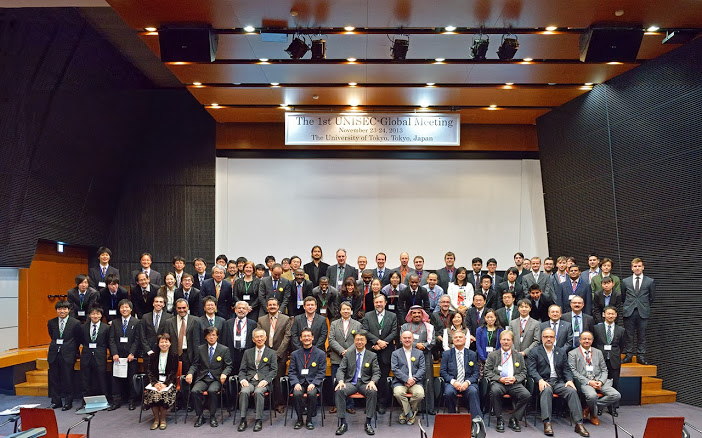Dušan Radosavljević is named for the UNISEC (University Space Engineering Consortium) point of contact (POC) in Serbia.
www.unisec-global.org/pointofcontact.html
www.unisec-global.org/dusan.html
Dušan Radosavljević is named for the UNISEC (University Space Engineering Consortium) point of contact (POC) in Serbia.
www.unisec-global.org/pointofcontact.html
www.unisec-global.org/dusan.html
The Unity program represents a response to the increasing need of individuals and groups for easier access to Space, in order to achieve sustainable progress in their work and development of this area.
The concept itself emerged in the post-conflict region as an attempt to re-establish the cooperation of the people in the region, but this time in a completely different way, which in itself goes beyond the current mode of thinking and demands a new approach in international relations, whereby independence in creation of each participant is not jeopardized, and on the other hand there is a constant presence of the necessity of cooperation among the participants. In this way, everyone achieves both individual and group goals, and progress is inevitable.
Technically, the Unity program is based on CubeSat standards (www.cubesat.org), since the main deployer (Mother Craft – MC) is CubeSat, primarily by dimensions and basic characteristics. The deployer MC is independent of the payload that it carries and which will be delivered into orbit. Most precisely, MC is an adapter that allows that non-standard satellites (DS) can be used in standard POD deployers.
The Unity program enables the low-cost launch of satellites into various orbits. The price of the launch of 1DS (11.0×10.0x2.4cm/250g) is 12000 – 14000 euros (payment in two installments).
| more details |
Razlog za uspostavljanje saradnje proizilazi iz veoma jednostavne činjenice, a to je da u ovoj oblasti jedni bez drugih ne možemo!
Sajt SRV-a: http://www.srv.org.rs/


Second phase of standardization of system for satellite monitoring of surface water quality in real-time and early-warning system (WQM) has been completed.
All electronic components has been tested on the field using a GSM module as transmitter. For storing the electronics was used a test buoy that will in the third, final, phase also be standardized. Standardization of the buoy is directly related to HUMSAT transmitter for which everything is ready and that will, of course, replace the GSM transmitter.
While we wait the HUMSAT transmitter from partners from the University of Vigo (Spain), it will be carried out further consultations with the Republic Hydrometeorological Service and the Agency for Environmental Protection.
Committee and the Aeronautical Union of Vojvodina agreed joint organization and realization of Summer School (a program of continuous professional development of teachers/professors):
CanSat Programme
– simulation of the entire process of space mission by model of
the European Space Agency –
Summer School is scheduled to begin in September of 2014.
A representative of the Committee participated on the „The First UNISEC-Global Meeting“ held on 23rd and 24th November 2013 on the University of Tokyo (Takeda Frontier Science Hall).
The purpose of the meeting is to announce the establishment of the UNISEC-Global which will provide, among others, the local UNISECs with a forum for exchange of opinions about their activities, and for exploring possible cooperative program/project in the context of UNISEC.
The meeting was attended by 260 delegations from 47 countries and regions.
For Secretary General of the Organization was elected Ms. Rei Kawashima.

Started development of system for satellite monitoring of surface water quality in real-time and early-warning system (WQM) within HUMSAT project.
The system consists of two major segments:
– segment of the the Earth (WQM);
– segment in Space (HUMSAT);
and use “Store & Forward” telecommunications technique.
Segment on Earth (WQM) develops Committee, and segment in Space develops University of Vigo (Spain) through the project HUMSAT (Humanitarian Satellite Constellation).
The project is supported by the office in charge of the United Nations – UNOOSA (United Nations Office for Outer Space Affairs) and the European Space Agency – ESA.
Established cooperation with dr Javier Avalos Garcia from Universidad Jesuita de Guadalajara (Mexico) on CanSat projects. Dr Javier Avalos Garcia is a professor on Faculty of Mechanical Engineering at the mentioned University.
– Field of specialization: Structures and vibrations.
– Present Research Interests: Structural vibrations, stochastic processes, arboriculture, sensorcraft development.
Collaboration with dr Javier Avalos Garcia regards primarily on the development of joint CanSat programs for primary, secondary and higher education levels.